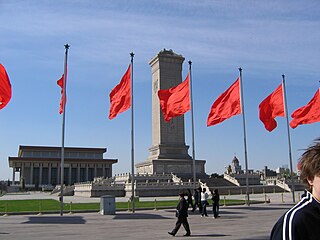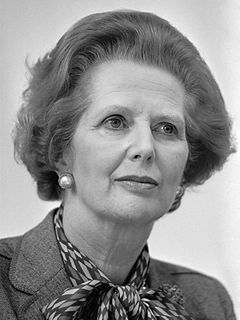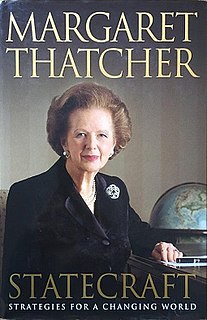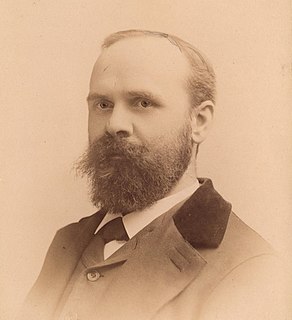
Socialism (/'soʊʃəlɪsm/) is a left-wing to far-left economic philosophy and movement encompassing a range of economic systems characterized by the dominance of social ownership of the means of production as opposed to private ownership. As a term, it describes the economic, political and social theories and movements associated with the implementation of such systems. Social ownership can be public, collective, or cooperative. While no single definition encapsulates the many types of socialism, social ownership is the one common element. Different types of socialism vary based on the role of markets and planning in resource allocation, on the structure of management in organizations, and from below or from above approaches, with some socialists favouring a party, state, or technocratic-driven approach. Socialists disagree on whether government, particularly existing government, is the correct vehicle for change.

Thatcherism is a form of British conservative ideology named after Conservative Party leader Margaret Thatcher. The term has been used to describe the principles of the British government under Thatcher from the 1979 general election to her resignation in 1990, and continuing into the Conservative governments under John Major and David Cameron. Proponents of Thatcherism are referred to as Thatcherites.

The 1987 United Kingdom general election was held on Thursday, 11 June 1987, to elect 650 members to the House of Commons. The election was the third consecutive general election victory for the Conservative Party, and second landslide under the leadership of Margaret Thatcher, who became the first Prime Minister since the Earl of Liverpool in 1820 to lead a party into three successive electoral victories.

Free-market anarchism, or market anarchism, also known as free-market anti-capitalism and free-market socialism, is the branch of anarchism that advocates a free-market economic system based on voluntary interactions without the involvement of the state. A form of individualist anarchism, and market socialism, it is based on the economic theories of mutualism and individualist anarchism in the United States.

"There is no alternative" (TINA) is a slogan strongly associated with the policies and persona of the Conservative British prime minister Margaret Thatcher.
Anarchist "economics" is the set of theories and practices of economic activity within the political philosophy of anarchism. Many anarchists are anti-authoritarian anti-capitalists, with anarchism usually referred to as a form of libertarian socialism, i.e. a stateless system of socialism. Anarchists support personal property and oppose capital concentration, interest, monopoly, private ownership of productive property such as the means of production, profit, rent, usury and wage slavery which are viewed as inherent to capitalism.
The nature of capitalism is criticized by left-wing anarchists, who reject hierarchy and advocate stateless societies based on non-hierarchical voluntary associations. Anarchism is generally defined as the libertarian philosophy which holds the state to be undesirable, unnecessary and harmful as well as opposing authoritarianism, illegitimate authority and hierarchical organization in the conduct of human relations. Capitalism is generally considered by scholars to be an economic system that includes private ownership of the means of production, creation of goods or services for profit or income, the accumulation of capital, competitive markets, voluntary exchange and wage labor which has generally been opposed by anarchists historically. Since capitalism is variously defined by sources and there is no general consensus among scholars on the definition nor on how the term should be used as a historical category, the designation is applied to a variety of historical cases, varying in time, geography, politics and culture.
Post-capitalism is a state in which the economic systems of the world can no longer be described as forms of capitalism. Various individuals and political ideologies have speculated on what would define such a world. According to some classical Marxist and some social evolutionary theories, post-capitalist societies may come about as a result of spontaneous evolution as capitalism becomes obsolete. Others propose models to intentionally replace capitalism. The most notable among them are socialism, anarchism, and degrowth.
Sir Alfred Sherman was an English writer, journalist, and political analyst. Described by a long-time associate as "a brilliant polymath, a consummate homo politicus, and one of the last true witnesses to the 20th century", he was a Communist volunteer in the Spanish Civil War but later changed his views completely and became an adviser to Margaret Thatcher.

The Politics of Individualism: Liberalism, Liberal Feminism, and Anarchism is a 1993 political science book by L. Susan Brown. She begins by noting that liberalism and anarchism seem at times to share common components, but on other occasions are in direct opposition to one another. She argues that what they have in common is "existential individualism", the belief in freedom for freedom's sake. However, she notes that in liberal works there exists also an "instrumental individualism", by which she means freedom to satisfy individual interests. Brown argues that the latter annihilates the intentions of the former because it allows individuals the "freedom" to disrupt the freedom of other individuals in its aim of achieving individual goals. On the other hand, instrumental individualism requires some degree of existential individualism to sustain itself.

Stephen Ronald Craig Hicks is a Canadian-American philosopher. He teaches at Rockford University, where he also directs the Center for Ethics and Entrepreneurship.
Anarchism is generally defined as the political philosophy which holds the state to be undesirable, unnecessary and harmful as well as opposing authority and hierarchical organization in the conduct of human relations. Proponents of anarchism, known as anarchists, advocate stateless societies based on non-hierarchical voluntary associations. While anarchism holds the state to be undesirable, unnecessary and harmful, opposition to the state is not its central or sole definition. Anarchism can entail opposing authority or hierarchy in the conduct of all human relations.

The Constitution of Liberty is a book by Austrian economist and Nobel Memorial Prize in Economic Sciences recipient Friedrich A. Hayek. The book was first published in 1960 by the University of Chicago Press. It is an interpretation of civilization as being made possible by the fundamental principles of liberty, which the author presents as prerequisites for wealth and growth, rather than the other way around.
Heaven on Earth: The Rise and Fall of Socialism (2005) is a three-hour PBS documentary film hosted by Ben Wattenberg and narrated by Henry Strozier. The series' Executive Producer is Andrew Walworth. The series was produced for PBS by New River Media, Inc. and first broadcast as a special edition of the television series Think Tank in June 2005.
Anarchy is a society being freely constituted without authorities or a governing body. It may also refer to a society or group of people that entirely rejects a set hierarchy. Anarchy was first used in English in 1539, meaning "an absence of government". Pierre-Joseph Proudhon adopted anarchy and anarchist in his 1840 treatise What Is Property? to refer to anarchism, a new political philosophy and social movement that advocates stateless societies based on free and voluntary associations. Anarchists seek a system based on the abolition of all coercive hierarchy, in particular the state, and many advocate for the creation of a system of direct democracy and worker cooperatives.

Statecraft: Strategies for a Changing World is a book on politics and international relations written by Margaret Thatcher in 2003 and was published by Harper Perennial.
Claire Berlinski is an American journalist and author. Born and raised in California and other parts of the United States, including New York City and Seattle, she read Modern History at Balliol College, Oxford where she earned a doctorate in International Relations. She has lived in Bangkok, where she worked for Asia Times; Laos, where she worked briefly for the United Nations Development Program; and Istanbul, where she worked as a freelance journalist. She now lives in Paris.
Types of socialism include a range of economic and social systems characterised by social ownership and democratic control of the means of production and organizational self-management of enterprises as well as the political theories and movements associated with socialism. Social ownership may refer to forms of public, collective or cooperative ownership, or to citizen ownership of equity in which surplus value goes to the working class and hence society as a whole. There are many varieties of socialism and no single definition encapsulates all of them, but social ownership is the common element shared by its various forms. Socialists disagree about the degree to which social control or regulation of the economy is necessary, how far society should intervene, and whether government, particularly existing government, is the correct vehicle for change.
Social anarchism, sometimes referred to as red anarchism, is the branch of anarchism that sees individual freedom as interrelated with mutual aid. Social anarchist thought emphasizes community and social equality as complementary to autonomy and personal freedom. It attempts to accomplish this balance through freedom of speech, which is maintained in a decentralized federalism, with freedom of interaction in thought and subsidiarity. Subsidiarity is best defined as "that one should not withdraw from individuals and commit to the community what they can accomplish by their own enterprise and industry" and that "[f]or every social activity ought of its very nature to furnish help to the members of the body social, and never destroy and absorb them", or the slogan "Do not take tools out of people's hands".

Benjamin Ricketson Tucker was an American free-market individualist anarchist and libertarian socialist. Tucker was the editor and publisher of the American individualist anarchist periodical Liberty (1881–1908). Tucker was a member of the socialist First International, while describing his form of anarchism as "consistent Manchesterism" and stated that "the Anarchists are simply unterrified Jeffersonian Democrats."










